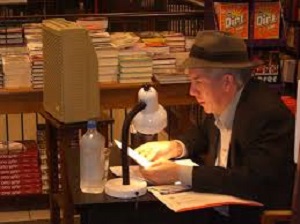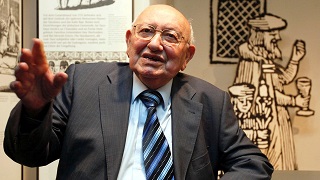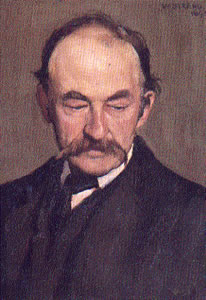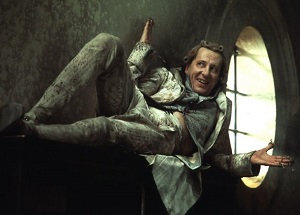De Amerikaanse schrijver Jim Knipfel werd geboren op 2 juni 1965 in Green Bay, Wisconsin. Zie ook alle tags voor Jim Knipfel op dit blog.
Uit: Unplugging Philco
“As furtively as possible he checked the three of them again. Still chatting. If they began moving his way he’ d need a new plan, and quick. If only there was another pedestrian to draw their attention away from him — but there never was. Nobody else was out at this hour. It would be simple enough to change his own schedule, he sometimes thought, but he knew it would never happen.
He flexed his legs and his toes, checked the sidewalk directly below him again, then took a deep breath and willed himself into action.
As he scrambled down the stairs like a convulsive heron, Wally told himself for the thirtieth time in as many days that it was about time he picked himself up a new pair of shoes. This old pair he was wearing was simply not made for scrambling of any kind. Not with soles worn that smooth and thin.
Without pausing at the bottom to see if they’d caught sight of him, he dashed across the sidewalk, staying as low as he could manage, and ducked between two parked cars. He was breathing heavy and sweating despite the cool breeze, but at least he had some decent cover here.
Holding on to the rear bumper of a cherry red Chrysler Xanax for support, he pushed himself up just enough to peer over the trunk and down the street.
They still hadn’t seen him, too engrossed as they were in their little chat.
Probably exchanging diapering tips and murder stories, he thought. He checked the street again.
There was someone at the stoplight two blocks away. He was driving one of those Dodge Dipsomatic GX Mini Forts, an enormous vehicle, almost a full lane and a half wide. It was little more than a street-modified tank, really, but they’d become quite popular lately.”

Jim Knipfel (Green Bay, 2 juni 1965)
De Duitse schrijver en literatuurcriticus Marcel Reich-Ranicki werd geboren op 2 juni 1920 in Włocławek, Polen. Zie ook alle tags voor Marcel Reich-Ranicki op dit blog.
Uit: Thomas Mann und die Seinen
“Wen immer er in den Mittelpunkt seiner Bücher stellte – Alexander den Großen oder König Ludwig II. von Bayern, Peter Tschaikowski oder einen jungen emigrierten Poeten, der Selbstmord begeht -, er hatte offenbar nie Hemmungen, seine eigenen Sorgen und Komplexe ganz ohne Umschweife in die Figuren seiner Helden zu projizieren. Daher sind es stets in außergewöhnlichem Maße persönliche, private, – intime Bücher. Sie enthüllen des Autors Leidenschaft für menschliche und allzumenschliche Schwächen, für das Abgründige und Pathologische, für die Randbezirke der Existenz. Todessehnsucht und Homoerotik sind die beiden dominierenden Motive.
Daß sich die Literatur, die einen gewissen Anspruch erhebt, dem Exhibitionismus nähern darf, ja nähern muß, ist wohl ebenso sicher wie der Umstand, daß immer dann, wenn das Talent des Schriftstellers versagt und er anstatt der literarischen Leistung nur die nackte Mitteilung über heikle Phänomene bietet, der fatale Eindruck einer Schamlosigkeit entsteht, die sich nicht rechtfertigen läßt: Denn sie zeugt nicht etwa vom Mut zur Erkenntnis und zur Vergegenwärtigung, sondern vom Mangel an Takt und Geschmack.
Klaus Mann hat den Vorwurf des Exhibitionismus offenbar nie gefürchtet. Er war in vielen Büchern um den Ausdruck für seine Qualen bemüht. Gefunden hat er ihn nie. In keinem einzigen seiner Werke vermochte er die Diskrepanz zwischen seinen literarischen Möglichkeiten und seinen Absichten zu beseitigen. Und niemals war diese Kluft tiefer als in dem Roman ‘Mephisto’ “.

Marcel Reich-Ranicki (2 juni 1920 – 18 september 2013)
De Duitse schrijfster Sibylle Berg werd geboren in Weimar op 2 juni 1962. Zie ook alle tags voor Sibylle Berg op dit blog.
Uit: Der Mann schläft
„Als ich auf dem Rückweg vom Kiosk erneut an dem Café vorbeikam, waren beide verschwunden.
Da man sich, wie ich an diesem kleinen Schattenspiel meiner Erinnerung merkte, der Realität nie allzu sicher sein durfte, betrat ich wenig später unser Haus mit Sorge.
Man konnte nicht oft genug überprüfen, ob all das, was einen froh machte, noch an seinem Platz war.
Mir war schwindelig geworden vor Erleichterung, denn der Mann war da.
Er lag und schlief und sah wunderbar dabei aus, doch, anders als bei den meisten seiner Spezies, die nur im Schlaf entspannt und reizend wirken, kannte sein Ausdruck keine Veränderungen; auch nach dem Erwachen würde er wie benommen bleiben und seinen schweren Körper bewegen, als wäre er in einem anderen Element zu Hause als in der Luft. Vielleicht nähme sich der Mann unter Wasser gewandt aus; doch ich hatte ihn noch nie tauchen sehen, denn er war zu träge für die meisten Aktivitäten, mit denen Menschen, die keiner körperlichen Arbeit nachgehen, ihr Leben verstreichen lassen.
Da alles an seinem Platz war und es nicht aussah, als wäre das, was ich für mein Leben hielt, nur Phantasie, konnte ich weiter meinem Tagesplan folgen.
Fast alle Menschen lieben geregelte Abläufe, da muss man sich nichts vormachen. Routine macht, dass wir nicht ins All abgetrieben werden, ohne Verbindung zur Raumstation. Nach der Zeitung, dem Gebäck folgte der Kaffee. Ich beobachtete, wie im Nachbarhaus, in das ich durch die Palmen hindurch sehen konnte, Menschen an Küchentische schlurften, verschwommen von der Nacht, das Licht kaum vorhanden, sodass es sich durchaus auch um großgewachsene Insekten handeln konnte, die von der Stadt Besitz ergriffen hatten.
Jeden Morgen stand ich vor der Tür und freute mich, dass ich die Nacht überlebt hatte, dass alle Häuser sich noch am Ort befanden und der Mann im Bett lag. Vielleicht war ich der einzige Mensch, der daran ein Vergnügen hatte, denn der Mann entsprach kaum dem, was man gemeinhin als Kleinod bezeichnete.“

Sibylle Berg (Weimar, 2 juni 1962)
De Canadese schrijfster Carol Shields werd op 2 juni 1935 in Oak Park, Chicago, geboren als Carol Warner. Zie ook alle tags voor Carol Shields op dit blog.
Uit: Small Ceremonies
“We had that last Sunday,” Meredith says, helping herself to butter. Always methodical, she keeps track of small ceremonies.
For us, Sunday high tea is a fairly recent ceremony, a ritual brought back from England where we spent Martin’s sabbatical year. We are infected, all four of us, with a surrealistic nostalgia for our cold, filthy flat in Birmingham, actually homesick for fog and made edgy by the thought of swerving red buses.
And high tea. A strange hybrid meal, a curiosity at first,it was what we were most often invited out to during our year in England. We visited Martin’s colleagues far out in the endless bricked-up suburbs, and drank cups and cups of milky tea and ate ham and cold beef, so thin on the platter it looked almost spiritual. the chirpy wives and their tranquil pipe-sucking husbands, acting out of some irrational good will, drew us into cozy sitting rooms hung with water colours, rows of Penguins framing the gasfires, night pressing in at the windows, so that snugness made us peaceful and generous. Always afterward, driving back to the flat in our little green Austin, we spoke to each other with unaccustomed charity, Martin humming and Meredith exclaiming again and again from the back seat how lovely the Blackstones were and wasn’t she, Mrs. Blackstone, a pet.
So we carry on the high tea ritual. But we’ve never managed to capture that essential shut-in coziness, that safe-from-the-storm solidarity. We fly off in midair. Our house, perhaps, is too open, too airy, and then again we are not the same people we were then; but still we persist.”

Carol Shields (Chicago, 2 juni 1935 – 16 juli 2003)
De Nederlandse sportjournalist en schrijver Jean Nelissen werd geboren in Geleen op 2 juni 1936. Zie ook alle tags voor Jean Nelissen op dit blog.
Uit: De Bijbel Van De Tour De France
“Een ronde waarin sommige renners tot idolen worden verheven, wierfaam zelfs hun dood overleeft. Zoals Fausto Coppi, die op een bergtop in het gehucht Castellania ligt begraven, omringd door aarde van de beruchte col Izoard. Een Tour waarvan de geschiedenis is doordrenkt met dramatiek van de relatief talrijke winnaars die vermoord werden of zelfde dood zochten, zoals René Pottier, Ottavio Bottecchia, Henri Pélissier, Hugo Koblet en Luis Ocana. Van oorsprong eenvoudige mannen met een aanvankelijk bescheiden verwachtingspatroon, die echter door hun sportieve successen in een andere wereld werden gekatapulteerd en er hun geestelijk evenwicht verloren. Dat is één van de gevaren van deelname aan de Tour. De verleiding om een sportheld te worden, de massa te ontstijgen, roem en rijkdom te vergaren, zal echter altijd sterker blijven.”

Jean Nelissen (2 juni 1936 – 1 september 2010)
Hier links naast Jan Raas en Peter Post
De Engels romanschrijver en dichter Thomas Hardy werd op 2 juni 1840 geboren in Higher Bockhampton, bij Dorchester. Zie ook alle tags voor Thomas Hardy op dit blog
A Confession To A Friend in Trouble
Your troubles shrink not, though I feel them less
Here, far away, than when I tarried near;
I even smile old smiles–with listlessness–
Yet smiles they are, not ghastly mockeries mere.
A thought too strange to house within my brain
Haunting its outer precincts I discern:
–That I will not show zeal again to learn
Your griefs, and, sharing them, renew my pain….
It goes, like murky bird or buccaneer
That shapes its lawless figure on the main,
And each new impulse tends to make outflee
The unseemly instinct that had lodgment here;
Yet, comrade old, can bitterer knowledge be
Than that, though banned, such instinct was in me!

Thomas Hardy (2 juni 1840 – 11 januari 1928)
Portret door Hardy by William Strang, 1893
De Franse schrijver Donatien Alphonse François, Markies de Sade werd geboren op 2 juni 1740 in Parijs. Zie ook alle tags voor Markies de Sade op dit blog.
Uit: Justine (Vertaald door Austryn Wainhouse)
“Form flecked his lips as he spoke these words interspersed with revolting oaths and blasphemies. The hand, which had been prying open the shrine he seemed to want to attack, now strayed over all the adjacent parts; he scratched them, he did as much to my breast, he clawed me so badly I was not to get over the pain for a forthnight. Next, he placed me on the edge of the couch, rubbed alcohol upon that mossy tonsure with which Nature ornaments the altar wherein our species finds regeneration; he set it afire and burned it. His fingers closed upon the fleshy protuberance which surmounts this same altar, he snatched at it and scraped roughly, then he inserted his fingers within and his nails ripped the membrane which lines it. Losing all control over himself, he told me that, since he had me in his lair, I might just as well not leave it, for that would spare him the nuisance of bringing me back down again; I fell to my knees and dared remind him again of what I had done in his behalf…. I observed I but further excited him by harping again upon the rights to his pity I fancies were mine; he told me to be silent, bringing up his knee and giving me a tremendous blow in the pit of the stomach which sent me sprawling on the flagstones. He seize a handful of my hair and jerked me erect. “Very well!” he said, “come now! prepare yourself; it is a certainty, I am going to kill you….”

Markies De Sade (2 juni 1740 – 2 december 1814)
Geoffrey Rush als de markies in de Amerikaanse film „Quills“ uit 2000
Zie voor nog meer schrijvers van de 2e juni ook mijn blog van 2 juni 2013 deel 2.
